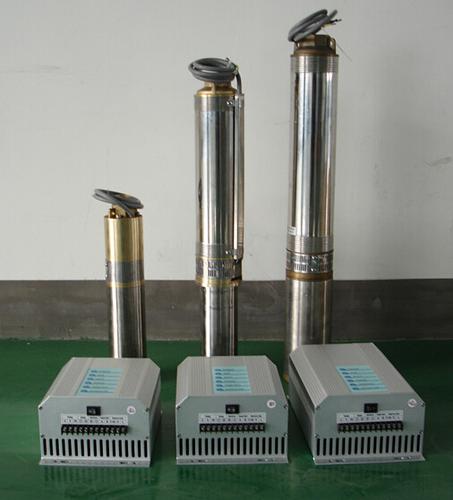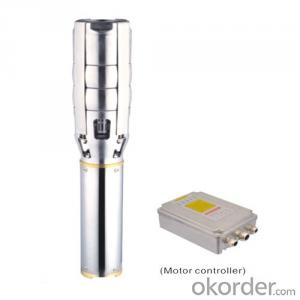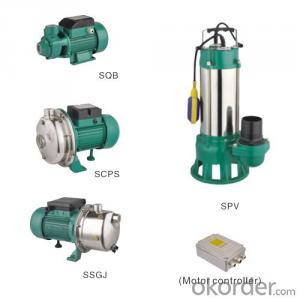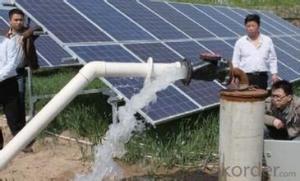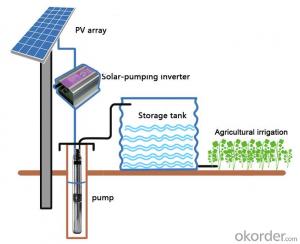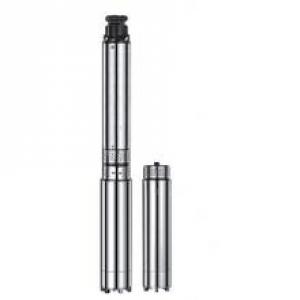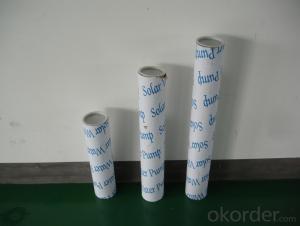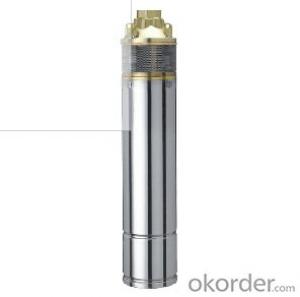Solar Deep Well Pump for A Pond
- Loading Port:
- China Main Port
- Payment Terms:
- TT OR LC
- Min Order Qty:
- -
- Supply Capability:
- -
OKorder Service Pledge
Quality Product, Order Online Tracking, Timely Delivery
OKorder Financial Service
Credit Rating, Credit Services, Credit Purchasing
You Might Also Like
pecifications
solar deep well pump1 sensorless brushless permanent magnet motor
2 water lubricated bearing
3 9 patents
solar deep well pump
Here we provide videos for your further recognization of our pumps
http://www.tudou.com/programs/view/WZTPg24M11s/
http://www.tudou.com/programs/view/xIPzLJwrhUE/
- Q: How does a solar pump help in reducing the use of pesticides?
- A solar pump aids in reducing the use of pesticides by providing a reliable and sustainable source of water for irrigation. With consistent access to water, farmers can implement more efficient watering techniques, such as drip irrigation, which targets the roots of plants. This reduces the amount of water wasted and minimizes the spread of pests and diseases that thrive in moist conditions. Additionally, solar pumps can power irrigation systems that spray pesticides directly on the plants, ensuring targeted application and minimizing the need for broad-spectrum spraying.
- Q: Can a solar pump be used for fish farming or aquaculture?
- Yes, a solar pump can be used for fish farming or aquaculture. Solar pumps are an environmentally friendly and cost-effective option for providing aeration, circulation, and water flow in fish ponds or aquaculture systems. They can help maintain optimal oxygen levels and water quality, which are crucial for the health and growth of fish. Additionally, solar pumps eliminate the need for electricity or fuel, making them a sustainable choice for fish farmers.
- Q: Can a solar pump be used for residential swimming pool heating?
- Yes, a solar pump can be used for residential swimming pool heating. Solar pumps are designed to circulate water using energy from the sun, making them a sustainable and cost-effective solution for heating pool water. By utilizing solar energy, these pumps can effectively heat the pool water, providing a comfortable swimming experience without the need for traditional heating systems that rely on electricity or gas. Additionally, solar pumps are environmentally friendly, as they reduce carbon emissions and dependency on non-renewable energy sources. Overall, a solar pump is a great option for residential swimming pool heating, offering both economic and environmental benefits.
- Q: How does a solar pump help in reducing soil erosion?
- A solar pump helps in reducing soil erosion by providing a sustainable and efficient method of irrigation. By using solar energy to power the pump, it eliminates the need for diesel or electric pumps which can contribute to greenhouse gas emissions and air pollution. This not only reduces the environmental impact but also reduces the cost of irrigation for farmers. By ensuring a consistent and controlled water supply, a solar pump helps in preventing soil erosion caused by excessive water runoff or lack of proper irrigation.
- Q: What is the expected noise level of a solar pump?
- The expected noise level of a solar pump is generally very low, as it operates using a silent motor and does not require any combustion or moving parts that produce noise.
- Q: How does a solar pump handle voltage variations in different countries?
- A solar pump typically handles voltage variations in different countries by utilizing an inbuilt voltage regulator or controller. This component ensures that the pump receives a consistent and appropriate voltage level, regardless of the voltage fluctuations in the local electrical grid. It helps protect the pump's motor and other internal components from potential damage caused by either overvoltage or undervoltage. Additionally, some solar pumps also include mechanisms such as maximum power point tracking (MPPT) to optimize energy conversion and further adapt to varying voltage conditions.
- Q: What is the maximum pumping depth of a solar pump?
- The maximum pumping depth of a solar pump can vary depending on factors such as the power of the solar panels, the efficiency of the pump, and the type of well or water source. However, on average, solar pumps are capable of pumping water from depths ranging between 100 and 600 feet.
- Q: Can a solar pump be used in areas with limited access to financing options?
- Yes, a solar pump can be used in areas with limited access to financing options. Solar pumps are a cost-effective and sustainable solution as they operate using renewable energy from the sun. They eliminate the need for fuel or electricity, reducing operational costs. Additionally, solar pumps have a longer lifespan and require minimal maintenance, making them a viable option for areas with limited financial resources.
- Q: How big of a solar panel is required for a solar pump?
- The size of a solar panel required for a solar pump depends on factors such as the power requirements of the pump, the amount of sunlight available, and the efficiency of the solar panel. It is recommended to consult with a solar energy professional or the manufacturer of the solar pump to determine the appropriate size of solar panel needed for optimal performance.
- Q: Can a solar pump be used for wastewater treatment?
- Yes, a solar pump can be used for wastewater treatment. Solar pumps can be effectively utilized in wastewater treatment systems to circulate and aerate the water, facilitating the breakdown of pollutants and promoting the growth of beneficial bacteria. This renewable energy solution can help reduce electricity costs and environmental impact, making it a sustainable choice for wastewater treatment processes.
Send your message to us
Solar Deep Well Pump for A Pond
- Loading Port:
- China Main Port
- Payment Terms:
- TT OR LC
- Min Order Qty:
- -
- Supply Capability:
- -
OKorder Service Pledge
Quality Product, Order Online Tracking, Timely Delivery
OKorder Financial Service
Credit Rating, Credit Services, Credit Purchasing
Similar products
Hot products
Hot Searches
Related keywords

